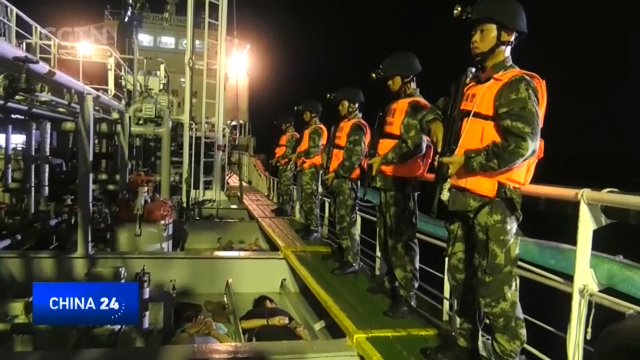
21:08, 27-Jun-2018
Cross-Border Drug Trafficking: China working with region to cut out supply channels
Updated
20:30, 30-Jun-2018
02:25

Drug trafficking is essentially a global black market dedicated to the distribution and sale of drugs. Most jurisdictions curtail illegal drug trade through various laws and deterrents, but local authorities also understand the importance of cross-border collaboration to cut out the supply channels. China's drugs-control watchdog briefed the media in Beijing today about their efforts in this regard. CGTN's Zhao Yunfei has the story.
Criminals burning drugs to wipe out evidence. Authorities put out the fire aboard the cargo ship. A dangerous, but common scenario for maritime law enforcement officials.
China has just released details on four major cases like these. Some have prompted joint actions by Chinese mainland police and Hong Kong authorities.
In January, members of a syndicate were found loading drugs in waters off the coast of Myanmar for a trafficking en route to Southeast Asia. China Coast Guard vessels successfully intercepted the target vessel in the South China Sea.
In a separate case in May, maritime police ordered the interception of an oil tanker suspected of drug trafficking in southern Chinese waters. Eight suspects were arrested.
LIANG YUN, VICE DIRECTOR CHINA NATIONAL NARCOTICS CONTROL COMMISSION "From these cases we can also see that drug crimes are still rampant. But Chinese law enforcement task forces have the ability and confidence to cope with this challenge."
Law enforcement on the water is risky. Some cases involve cross-border trafficking, making the situation more complex.
"What specific measures have the Narcotics commission and maritime police taken to crack down drug trafficking?"
LIANG YUN, VICE DIRECTOR CHINA NATIONAL NARCOTICS CONTROL COMMISSION "Another important task in maritime investigation is to work with relevant countries. In this regard, corresponding channels of communication with neighboring countries are also established."
Governments have taken steps to upgrade communication and connectivity mechanisms regarding maritime drug enforcement. Cases in point - China, Myanmar, Laos and Afghanistan, which now all enjoy enhanced correspondence.
ZHAO YUNFEI BEIJING "China released its latest drug situation report on Monday, saying bulk maritime illicit drug trafficking is alive and rampant. 35 major cases were cracked down in 2017, but challenges lie ahead. Zhao Yunfei, CGTN, Beijing."

SITEMAP
Copyright © 2018 CGTN. Beijing ICP prepared NO.16065310-3
Copyright © 2018 CGTN. Beijing ICP prepared NO.16065310-3